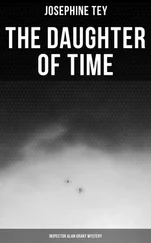And for two days he settled back in a sort of happy impatience to wait for Williams’s reply. He inspected the unfishable Turlie, pool by pool; he caulked the boat at Lochan Dhu; he walked the hill in the company of Graham the shepherd with Tong and Zang more or less at heel; and he listened to Tommy’s plan for a nine-hole private golf course between the house and the hillside. And on the third day he went homing at post time with an eagerness he had not known since he was nineteen and used to send his poems to magazines.
Nor was his blank unbelief when there was nothing for him any less poignant than it had been in those callow years.
He reminded himself that he was being unreasonable. (The unforgivable sin, always, in Grant’s estimation.) The inquest had nothing to do with the Department. He did not even know which Division might have been landed with the job. Williams would have to find out. Williams had work of his own; twenty-four-hours-a-day work. It was unreasonable to expect him to drop everything to satisfy some holiday-making colleague’s frivolous questions.
For two more days he waited, and then it came.
Williams hoped that Grant wasn’t hankering after work. He was supposed to be having a rest, and everyone in the Department hoped that he was getting it (not everyone! thought Grant, remembering Bryce) and feeling the better for it. They missed him very badly. As to Charles Martin, there was no mystery about him. Or about his death, if that is what Grant had been thinking. He had hit the back of his head against the edge of the porcelain wash-hand basin, and although able to crawl around for a little on his hands and knees and eventually reach the bed, he had died from internal haemorrhage very shortly after falling over. The fact that he had fallen backwards at all was due to the amount of neat whisky he had consumed. Not enough to make him drunk but quite enough to make him muzzy, and the tilt of the coach as it changed direction had done the rest. There was no mystery either about the man himself. He had had the usual bundle of French identity papers in his possession, and his people were still living at his home address near Marseilles. They had not seen him for some years—he had left home after being in trouble for stabbing his girl in a fit of jealousy—but they had sent money to bury him so that he should not be buried in a pauper’s grave.
This left Grant with an appetite whetted rather than assuaged.
He waited until, according to his reckoning, Williams would be happily settled down with his pipe and his paper, while Mrs Williams mended and Angela and Leonard did their homework, and put in a personal call to him. There was always the chance that Williams was out pursuing the ill-doer through the devious ways of his inhabiting, but there was, too, the chance that he was at home.
He was at home.
When he had been duly thanked for his letter, Grant said: ‘You said his people sent money to bury him. Didn’t anyone come to identify him?’
‘No; they identified a photograph.’
‘A live photograph?’
‘No, no. A photograph of the body.’
‘Didn’t anyone turn up to identify him in London?’
‘Not a soul, it seems.’
‘That’s odd.’
‘Not so odd if he was a wide boy. Wide boys don’t want trouble.’
‘Was there any suggestion that he was wide?’
‘No, I don’t think so.’
‘What was his profession?’
‘Mechanic.’
‘Did he have a passport?’
‘No. Just the usual papers. And letters.’
‘Oh, he had letters?’
‘Yes; the usual odd two or three that people carry. One was from a girl saying she would wait for him. She’s going to wait some time.’
‘Were the letters in French?’
‘Yes.’
‘What money had he?’
‘Wait a minute till I find my notes. Um—m—m. Twenty-two, ten, in mixed notes; eighteen and tuppence ha’penny in silver and copper.’
‘All English?’
‘Yes.’
‘Between the lack of passport and the English currency it looks as if he had been in England a good long time. I wonder why no one came to claim him.’
‘They may not know yet that he is dead. It didn’t get much publicity.’
‘Didn’t he have any address in Britain?’
‘He had no address on him. The letters were not in envelopes: just in his wallet. His friends will probably turn up yet.’
‘Does anyone know where he was going? Or why?’
‘No; seemingly not.’
‘What luggage had he?’
‘An overnight case. Shirt, socks, pyjamas and bedroom slippers. No laundry marks.’
‘ What? Why? Were the things new?’
‘No, oh, no.’ Williams sounded amused at Grant’s overt suspicion. ‘Very well worn.’
‘Maker’s name in the slippers?’
‘No; those hand-made thick leather things you find in North African bazaars and in the Mediterranean ports.’
‘What else?’
‘In the case? A New Testament in French, and a yellow paper-backed novel, also in French. Both well worn.’
‘Your three minutes are up,’ said the Post Office.
Grant had another three minutes, but he got no nearer an explanation of B Seven. Apart from the fact that he had no record, either in France (the stabbing had been merely a domestic incident, it seemed) or in Britain, nothing was known of him. It was indeed typical that the one positive thing about him should be a negation.
‘By the way,’ Williams said, ‘when I was writing I quite forgot to answer your postscript.’
‘What postscript?’ Grant asked, and then remembered that he had written as an afterthought:
‘If you ever have nothing better to do you might ask the Special Branch if they are interested at all in a man called Archibald Brown. Scottish patriot. Ask for Ted Hanna and tell him I was asking.’
‘Oh, yes, of course. About the patriot. Did you have time to do anything about it? It wasn’t important.’
‘Well, as it happened, I met your reference on a Whitehall bus, day before yesterday. He says he has nothing against your bird but they would very much like to know who the ravens are. Do you know what he was talking about?’
‘I think I do,’ Grant said, amused. ‘I’ll do my best to find out for them. Just as a piece of holiday homework, tell him.’
‘You keep your mind off your work, if you please, and get well enough to be back here before the place falls to pieces without you.’
‘The shoes he was wearing: where were they made?’
‘Who was wearing? Oh. Yes. Karachi.’
‘ Where? ’
‘Karachi.’
‘Yes, that’s what I thought you said. He seems to have got around. No name on the fly-leaf of the Testament?’
‘Don’t think so. I don’t think I made any note of that when I read the evidence. Just a minute. Oh, yes, I did. No name.’
‘And no one in “missing persons” that fits him?’
‘No. No one. No one even approximately like him, it seems. He isn’t “missing” from anywhere.’
‘Well, it was wonderful of you to go to all that trouble for me instead of telling me to go fish in my burn. I’ll do as much for you some day.’
‘Are the fish in your burn biting?’
‘There’s hardly any burn, and the fish are cowering in the deepest recesses of the remaining pools. That is why I am reduced to taking an interest in cases that aren’t worth a flicker of real interest in busy places like South West One.’
But he knew that that was not so. It was not boredom that had driven him to this interest in B Seven. This—he had almost said—alliance. He had a curious feeling of identification with B Seven. Not in the sense of being one, but in the sense of having an identity of interests. This, in view of the fact that he had seen him only once and knew nothing whatever about him, was highly unreasonable. Was it perhaps that he had thought of B Seven as also wrestling with demons? Had the feeling of personal interest, the championship, begun in that?
Читать дальше












